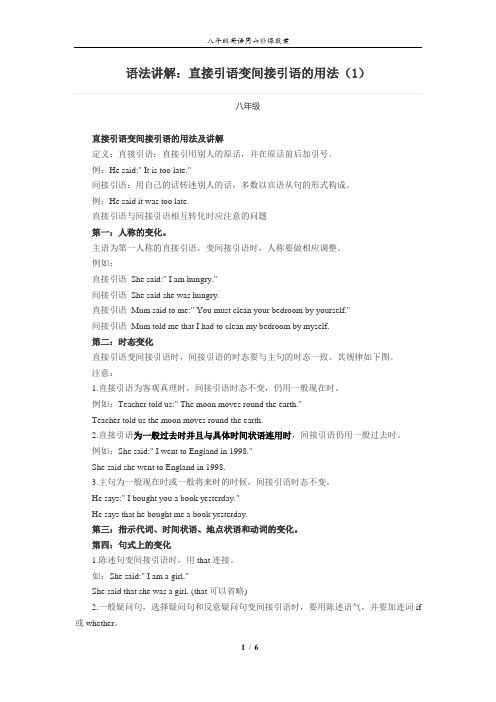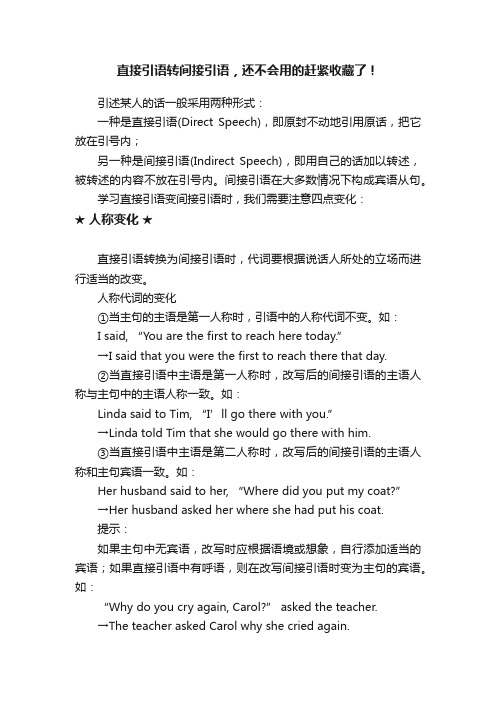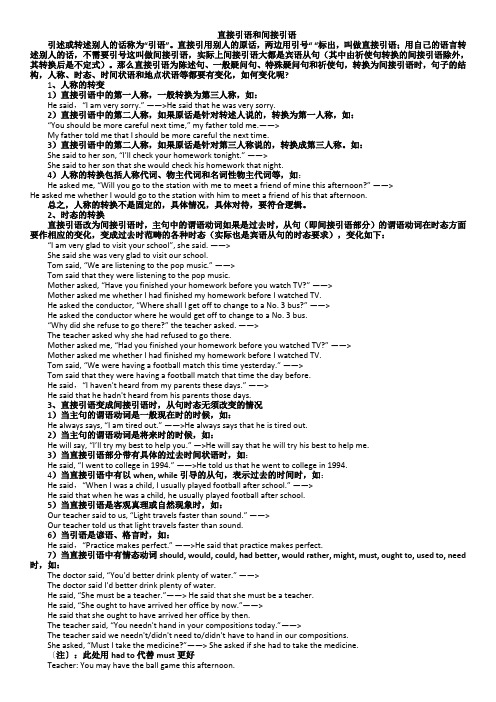2019小升初英语语法感叹句知识点:感叹句变为间接引语
英语直接引语变间接引语用法

语法讲解:直接引语变间接引语的用法(1)八年级直接引语变间接引语的用法及讲解定义:直接引语:直接引用别人的原话,并在原话前后加引号。
例:He said:" It is too late."间接引语:用自己的话转述别人的话,多数以宾语从句的形式构成。
例:He said it was too late.直接引语与间接引语相互转化时应注意的问题第一:人称的变化。
主语为第一人称的直接引语,变间接引语时,人称要做相应调整。
例如:直接引语She said:" I am hungry."间接引语She said she was hungry.直接引语Mum said to me:" You must clean your bedroom by yourself."间接引语Mum told me that I had to clean my bedroom by myself.第二:时态变化直接引语变间接引语时,间接引语的时态要与主句的时态一致。
其规律如下图。
注意:1.直接引语为客观真理时,间接引语时态不变,仍用一般现在时。
例如:Teacher told us:" The moon moves round the earth."Teacher told us the moon moves round the earth.2.直接引语为一般过去时并且与具体时间状语连用时,间接引语仍用一般过去时。
例如:She said:" I went to England in 1998."She said she went to England in 1998.3.主句为一般现在时或一般将来时的时候,间接引语时态不变。
He says:" I bought you a book yesterday."He says that he bought me a book yesterday.第三:指示代词、时间状语、地点状语和动词的变化。
初中语法直接引语转换间接引语讲解附练习题及答案

直接引语与间接引语直接引语:一字不改的引用或复述别人的话,被引用或复述的部分即为直接引语;一般前后用引号,首字母大写;间接引语:用自己的话转述别人的话,被转述的部分即为间接引语;通常以宾语从句的形式出现,不用引号;直接引语变为间接引语时,要注意人称、时态、连接词、语序以及时间状语、地点状语、指示代词及方向性动词的变化;一、人称变化直接引语是第一人称变为间接引语时,一般要变为第三人称;第二人称变为与主句的间接宾语相一致的人称如果没有间接宾语,可根据上下文的体会确定一个人称;第三人称一般不改变;例如 He told me,"I’ll give you a book when I meet you again."—He told me he would give me a book when he met me again.二、时态的变化如果主句是过去式态,变为间接引语时应向前推一个时态;即一般现在时---一般过去式,现在进行时---过去进行时,现在完成时---过去完成时,一般过去时---过去完成时,过去进行时---过去进行时,一般将来时---过去将来时,现在完成进行时---过去完成进行时,过去完成时---过去完成时,过去完成进行时---过去完成进行时;等;例如She wondered:"When will the meeting begin."—She wondered when the meeting would begin.但在以下几种情况下,间接引语的时态不用变化;1、当直接引语表示的是客观真理或经常性的特点时;例如 She said,"The earth goes around the sun".--She said that the earth goes around the sun.2、当直接引语中有绝对具体的过去时间作状语时,保持原来的一般过去时; 例如 He said,"I left home in 1942.—He said he left home in 1942.注:间接引语中的谓语动词有时需要适当的调整;Say后的直接引语表示陈述或命令时可变为ask; say后的直接引语表示请求或询问时可变为ask.例如 The teacher said to me,"I have seen your book.."—The teacher told me that she had seen my book.三、连接词的选择1、陈述句陈述句转化为间接引语时用that引导,也可省略 that;主句谓语动词可用直接引语中的said,也可用told来代替,可以说said that,said to sb. that, told sb. that, 不可以直接说told that.主句中的谓语还常有repeat, answer, reply, explain, announce, declare, think, 等;例如Danny said,"I come from Canada."—Danny said that he came from Canada.2、疑问句直接引语是疑问句变为间接引语时要用陈述语序;主句的动词常用ask,wonder,want to know 等; 1、一般疑问句直接引语为一般疑问句时变为间接引语须用if或whether引导;例如 She asked me,"Is he a teacher "—She asked me if/whether he was a teacher.2}、选择疑问句或反意疑问直接引语是选择疑问句需用or;反意疑问句需用or not变为间接引语时要用whether而不用if.例如 My brother asked me,"Is Tom tall or short "—My brother asked me whether Tom was tall or short."You are reading,aren’t you"he said to me.—He asked me whether I was reading or not.3、特殊疑问句当直接引语为特殊疑问句变为间接引语时,常变成与疑问句同形的连接词引导的宾语从句,用陈述语序,问号变句号;例如"What do you want to eat "he asked me.—He asked me what I wanted to eat. 3、祈使句直接引语是祈使句变为间接引语时,要用不定式表示,使其成为 ask /tell /order sb not to do sth 句型;例如"Don’t open the door."he said to her.—He asked her not to open the door.4、感叹句感叹句变为间接引语时可用 what或how引导,也可用that引导;例如 He said,"What a lovely day it is"—He said what a lovely day it was.—He said that it was a lovely day.四、语序的变化当直接引语是疑问句变为间接引语时要用陈述语序,即连接词+主语+动词的形式;例如"Where are you going "he asked me.—He asked me where I was going.但当直接引语中特殊疑问词作主语时,语序不变;例如He asked, “Who is your brother.” -He asked who was my brother.五、时间状语、地点状语、指示代词及方向性动词的变化;now—then today—that day yesterday—the day before last might—the night before two days ago—two days before next week—the next week tomorrow—the next day the day after tomorrow—in two days’time 或者two days after here—there this—that these—those come—go bring—take 例如 He said,"I did my homework yesterday."—He said he had done his homework the day before.六、情态动词的变化can—could must—had to或者must will—would shall—should may—might一、单项选择:1. He asked ________ for the computer.A. did I pay how muchB. I paid how muchC. how much did I payD. how much I paid2. “Have you seen the film” he asked me. →He asked me ________. A. had I seen the film B. have I seen the film C. if I have seen the film D. whether I had seen the film3. “Please close the window,” he said to me. →He ________ me ________ the window.A. said to; to closeB. told to; closingC. asked; to closeD. said to; please close4. “I am a teacher,” Jack said. →He said ________.A. that I am a teacherB. I was a teacherC. that he is a teacherD. he was a teacher5. He said, “Mother, the boy is very naughty.” →He ________ very naughty.A. said his mother that the boy wasB. said to his mother that the boy isC. told his mother that the boy wasD. spoke to his mother that the boy is6. “You’ve already got well, haven’t you” she asked. →She asked ________or not.A. if I have already got well, hadn’t youB. whether I had already got wellC. have I already got wellD. had I already got well7. He asked, “Are you a Party member or a League member”→He asked me ________.A. am I a Party member or a League memberB. was I a Party member or a League memberC. if I was a Party member or a League memberD. whether was I a Party member or a League member8. He asked, “How are you getting along” →He asked ________.A. how am I getting alongB. how are you getting alongC. how I was getting alongD. how was I getting along 9. He asked me ________ with me.A. what the matter isB. what the matter isC. what’s th e matterD. what was wrong10. He said, “Don’t do that again.” →He ________ me ________ that again.A. said to; not to doB. said to; don’t doC. told; don’t doD. told; not to do二、直接引语转换间接引语1. “I saw a note on my desk.” she said.2. Mother said, “I’ll go to the park tomorrow.”3. He said to me, “Your brother broke it.”4. Tom said, “My sister was here three days ago.”5. “We stayed there for two weeks.” she told me.6. She said, “I have given up smoking.”7. “We’ve known each other for about three years.” the young man told him.8. “I haven’t seen her these days.” he said.9. “Mother gave me a new book as a present yesterday.” Mary said.10. “Do you like English or Chinese” the teacher asked me.11. “What did you do yesterday” she asked me.12. “Would you like an apple” mother asked me.13. “Don’t open the door.” she sai d to me.14. “Come here early tomorrow.” the teacher said to us.15. “Did you go to the cinema last night” she asked.16. “Keep the door closed.” the old man said to us.17. “Did you go there by train or by bus” the teacher asked.18. “They are playing on the playground.” Jim said.三、在横线上填上合适的词1. He exclaimed how lovely the house ___________.2. We didn’t know ___________ she hadn’t handed in the paper.3. The monitor ___________ the five of us to clean the floor yesterday afternoon.4. Anderson told us ___________ his father had just returned from Shanghai.5. She ___________ us to help the old woman in our village that day.6. My father asked me ___________ was the matter when he came back.7. That fellow always ___________ me clean his shoes for him.8. Tom said that he ___________ in the army for three years.9. — What did Alice say just now — She said that ___________ would borrow that dictionaryform Mary.10. I wonder ___________ she can attend my party this evening.四、单项选择1. Right now, the boss ordered John to hand in his design ________.A. this afternoonB. this afternoonC. todayD. that day2. Jimmy ________ her if she had seen him there that afternoon. A. said to B. askedC. toldD. ask3. Uncle Wang ordered us to ________ his house at once. A. come out of B. come C. goout of D. go4. The road is covered with snow. I can’t understand ________ they insist on going by motor-bike.A. whyB. whetherC. whenD. how5. Chen Qiang told Mr. Smith that the People’s Republic of China _______ in October 1,1949.A. foundedB. had been foundedC. foundD. was founded6. She said to me that _______ might keep ________ book for two days.A. she; thisB. I; thatC. I; thisD. you; this7. In order to choose the right one, she first asked me _______ I want to use a dictionary for.A. whatB. whyC. howD. whether8. Customers are asked to make sure that they _______ the right change before leaving the shop.A. will giveB. have been givenC. have givenD. will be given9. Linda shouted that you _______ your homework ahead of her.A. finishedB. would finishC. had finishedD. have finished10. My girlfriend asked me _______ I knew it was her birthday that day or not.A. whetherB. thatC. whyD. what五、巩固练习:1、He asked,"Is the door open or closed."He asked _____ _____ _____ _____ _____ _____ _____.2、She said,"I have left my coat in your room."She said _____ _____ _____ _____ _____ ______ ______ ______.3、She said,"I wrote to my friends yesterday."She said _____ _____ _____ _____ _____ _____ ______ ______ _______ ______.4、Mother asked me,"When will you be back next time."Mother asked me_____ _____ _____ _____ _____ _____ _____ _____.5、The teacher told the students,"The earth is round."The teacher told the students_____ _____ _____ _____ _____ .6、The guard said to Lenin,"Please show me your pass."The guard asked Tom_____ _____ _____ _____ _____ .7、Danny said ,"Are you leaving today or tomorrow, Ling Ming "Danny asked Li Ming_____ _____ _____ _____ _____ _____ _____ ______ ______ ______.8、He said ,"My sister was here two days ago, but she is not here now"He said _____ _____ _____ _____ _____ _____ _____ _____, but_____ was not there then.参考答案:一、单项选择1-5 DDCDC BDCDD二、直接引语转换间接引语参考答案1. She said that she had seen a note on her desk.2. Mother said that she would go to the park the next day.3. He told me that my brother had broken it.4. Tom said that hissister had been there three days before. 5. She told me that they had stayed there for two weeks. 6. She said that she had given up smoking. 7. The young man told him that they had known each other for about three years. 8. He said that he hadn’t seen her those days.9. Mary said that her mother had given her a new book as a present the day before. 10. The teacher asked me whether I liked English or Chinese. 11. She asked me what I had done the day before. 12. Mother asked me if/whether I would like an apple. 13. She asked me not to open the door. 14. The teacher told us to go there early the next day. 15. She asked whether/if I had gone to the cinema the night before. 16. The old man told me us to keep the door closed. 17. The teacher asked whether we had gone there by train or by bus.18. Jim said that they were playing on the playground.三、在横线上填上合适的词1. Was2. why/ that3. asked/ ordered4. that5. advised /asked / ordered6. what7.lets / has / makes8. had been / had served9. she 10.if / whether四、单项选择1-5DBCAD 6-10BABCA五、巩固练习:答案:1. if the door was open or closed 2. she had left her coat in my room3. that she had written to her friends the day before 4 .when I would be back the next time 5. that the earth is round 6 .to show him his pass7 .whether he was leaving that day or the next day 8. his sister had been there two days before ,she .。
直接引语转间接引语,还不会用的赶紧收藏了!

直接引语转间接引语,还不会用的赶紧收藏了!引述某人的话一般采用两种形式:一种是直接引语(Direct Speech),即原封不动地引用原话,把它放在引号内;另一种是间接引语(Indirect Speech),即用自己的话加以转述,被转述的内容不放在引号内。
间接引语在大多数情况下构成宾语从句。
学习直接引语变间接引语时,我们需要注意四点变化:★ 人称变化★直接引语转换为间接引语时,代词要根据说话人所处的立场而进行适当的改变。
人称代词的变化①当主句的主语是第一人称时,引语中的人称代词不变。
如:I said, “You are the first to reach here today.”→I said that you were the first to reach there that day.②当直接引语中主语是第一人称时,改写后的间接引语的主语人称与主句中的主语人称一致。
如:Linda said to Tim, “I’ll go there with you.”→Linda told Tim that she would go there with him.③当直接引语中主语是第二人称时,改写后的间接引语的主语人称和主句宾语一致。
如:Her husband said to her, “Where did you put my coat?”→Her husband asked her where she had put his coat.提示:如果主句中无宾语,改写时应根据语境或想象,自行添加适当的宾语;如果直接引语中有呼语,则在改写间接引语时变为主句的宾语。
如:“Why do you cry again, Carol?” asked the teacher.→The teacher asked Carol why she cried again.④当直接引语中主语是第三人称时,改写时不发生变化。
小升初复习直接引语与间接引语

小升初复习直接引语与间接引语直接引语和间接引语是语法中常用的两种表达方式,特别在小升初英语考试中,直接引语和间接引语的使用频率较高。
了解和灵活运用这两种引语形式是提高语言能力的关键。
本文将对直接引语和间接引语的概念、用法、转换规则等进行介绍和解析。
一、直接引语直接引语是指直接引述他人的原话或句子。
在句子中,直接引语通常用引号括起来,并与引语前后的动词用逗号或冒号隔开。
例如:1.她说:“我喜欢看书。
”2.他大声喊道:“请帮我一下!”3.他告诉我说:“明天会下雨。
”二、间接引语间接引语是指将别人的原话或句子通过自己的语言来转述。
在句子中,间接引语通常不用引号括起来,而是通过动词引导引语的引入,并按照陈述句的语序进行调整。
例如:1.她说她喜欢看书。
2.他大声喊道,要我帮他一下。
3.他告诉我明天会下雨。
三、直接引语和间接引语的转换在实际应用中,我们经常需要将直接引语转换为间接引语,或者将间接引语转换为直接引语。
以下是一些常见的规则:1.如果直接引语是陈述句,转为间接引语时,动词通常改为相应的陈述动词,如“say”、“tell”、“ask”等,并根据时态和人称的不同进行调整。
例如:直接引语:他说:“我很忙。
”间接引语:他说他很忙。
直接引语:她告诉我:“我已经做完作业了。
”间接引语:她告诉我她已经做完作业了。
2.如果直接引语是疑问句,转为间接引语时,动词通常改为相应的疑问动词,并根据时态和人称的不同进行调整。
同时,需要注意将疑问句变为陈述句的词序。
例如:直接引语:他问我:“你去过北京吗?”间接引语:他问我是否去过北京。
直接引语:她问:“你们几点来接我?”间接引语:她问我们几点来接她。
3.如果直接引语是祈使句,转为间接引语时,动词通常改为相应的祈使动词,并根据时态和人称的不同进行调整。
例如:直接引语:他对我说:“给我一杯水。
”间接引语:他对我说要给他一杯水。
直接引语:她告诉我:“别忘了交作业。
”间接引语:她告诉我别忘了交作业。
直接引语和间接引语

• •
•
•
•
(二) 如果直接引语是一般疑问句或选择疑问句 时 ,间接引语常变为由whether/if引导,而且 要用陈述句语序。如: 1) The boy asked his mother, “Can I go to play football with my friends on Saturday?” The boy asked his mother whether/if he could go to play football with his friends on Saturday. 2) “Will you go to the museum this weekend or next weekend?” Li Hua asked me. Li Hua asked me whether/if I would go to the museum this weekend or the next weekend.
(三) 直接引语是祈使句,变间接引语 时,谓语动词可根据语气强弱选则 beg, advise, ask, tell, order, warn 等。如果祈使句是否定句,还需在不 定式符号to前加not.如: I said to her, “Please pass me a glass of water.” I asked her to pass me a glass of water. She said, “Don’t smoke in the public place.” She told me not to smoke in the public place.
(四)直接引语是感叹句,变间接引 语时,引述动词常用tell, exclaim 或say等。如: “How well he looks!” he said. He exclaimed how well he looked. He said that he looked well.
直接引语和间接引语知识点归纳

直接引语和间接引语引述或转述别人的话称为“引语”。
直接引用别人的原话,两边用引号“ “标出,叫做直接引语;用自己的语言转述别人的话,不需要引号这叫做间接引语,实际上间接引语大都是宾语从句(其中由祈使句转换的间接引语除外,其转换后是不定式)。
那么直接引语为陈述句、一般疑问句、特殊疑问句和祈使句,转换为间接引语时,句子的结构,人称、时态、时间状语和地点状语等都要有变化,如何变化呢?1、人称的转变1)直接引语中的第一人称,一般转换为第三人称,如:He said,“I am very sorry.” ——>He said that he was very sorry.2)直接引语中的第二人称,如果原话是针对转述人说的,转换为第一人称,如:“You should be more careful next time,” my father told me.——>My father told me that I should be more careful the next time.3)直接引语中的第二人称,如果原话是针对第三人称说的,转换成第三人称。
如:She said to her son, “I'll check your homework tonight.” ——>She said to her son that she would check his homework that night.4)人称的转换包括人称代词、物主代词和名词性物主代词等,如:He asked me, “Will you go to the station with me to meet a friend of mine this afternoon?” ——>He asked me whether I would go to the station with him to meet a friend of his that afternoon.总之,人称的转换不是固定的,具体情况,具体对待,要符合逻辑。
直接引语变间接引语英语

直接引语变间接引语英语直接引语是指按照原文原话进行引述的句子,而间接引语则是将原文的意思转述为自己的话语,并用相应的语法变化。
在英语中,直接引语和间接引语的使用具有一定的规则和注意事项。
本文将对直接引语变为间接引语的相关内容进行介绍和说明。
首先,直接引语变为间接引语时,需要注意动词的变化。
根据引言动词的不同,需要根据时态和人称进行相应的变化。
例如,如果引言动词是现在时态,需要将直接引语中的动词改为相应的过去时态;如果引言动词是过去时态,需要将直接引语中的动词改为相应的过去完成时态等。
同时,人称也需要进行相应的变化,例如将第一人称变为第三人称等。
其次,间接引语中的句子结构也需要进行调整。
在直接引语中,常常会使用到引号和冒号等标点符号,而在间接引语中则不需要使用这些标点符号。
同时,如果直接引语中存在疑问句或感叹句,则在间接引语中需要将其变为陈述句。
另外,还需要注意引言介词的使用。
根据引言动词的不同,需要使用相应的引言介词来引导间接引语。
例如,常用的引言介词有"that"、"if"等。
最后,要特别注意句子之间的逻辑关系和语气。
在直接引语变为间接引语时,要保持原文中的逻辑关系和语气一致。
例如,如果直接引语中是陈述句,则在间接引语中也应保持陈述句的形式;如果直接引语中是疑问句,则在间接引语中也应保持疑问句的形式。
总的来说,直接引语变为间接引语是英语中常见的语法转换,需要注意动词、句子结构、引言介词和语气等方面的变化。
通过准确使用这些规则,可以使文本表达更加精确和生动,从而提高文章的质量和可读性。
以上就是关于直接引语变间接引语的介绍,希望能对您有所帮助。
英语语法中直接引语和间接引语知识讲解

英语语法中直接引语和间接引语知识讲解编者按:当我们直接引用别人的原话时,叫直接引语,当我们用自己的口吻和角度转述他人的话时,叫间接引语。
下面小编就来带你一起学习下直接引语和间接引语,希望对大家有帮助。
1.直接引语当我们直接引用别人的原话时,叫直接引语,通常用双引号“…”括起来。
例如:He said, “I like to speak French.”他说,“我喜欢说法语。
”2.间接引语当我们用自己的口吻和角度转述他人的话时,叫间接引语。
He said that he liked to speak French.他说他喜欢说法语。
由于是转述,人称、时间、地点等都要变了,所以将直接引语变成间接引语时,有7种情况需要改变:1)人称变化(从转述者的角度看)I,you (你)→he, shemy,your→his, their2)时态变化(把时间往过去相应地退一步)现在一般时→过去一般时现在进行时→过去进行时3)时间的变化now→thentoday→thatday4)地点的变化here→therethis place→that place5)疑问句变成(陈述句)宾语从句She asked, “Do you remember me?”→She asked whether her remembered her.6)祈使句变成不定式或者宾语从句Jack said, “Sit down here.”→Jack asked him to sit down there.7)感叹句转换时的变化He said, “How beautiful this place is!”→He said that place was so beautiful.本文作者:丹丹英语(公众号:英语语法学习)。
- 1、下载文档前请自行甄别文档内容的完整性,平台不提供额外的编辑、内容补充、找答案等附加服务。
- 2、"仅部分预览"的文档,不可在线预览部分如存在完整性等问题,可反馈申请退款(可完整预览的文档不适用该条件!)。
- 3、如文档侵犯您的权益,请联系客服反馈,我们会尽快为您处理(人工客服工作时间:9:00-18:30)。
2019小升初英语语法感叹句知识点:感叹句变为间接
引语
小升初英语语法感叹句知识点:感叹句变为间接引语
有些直接引语比较特殊,在变为间接引语时没有固定的方法,需根据句意选用恰当的表达方式——如当直接引语时感叹句时:
“What a crime he has committed!” she said.
“他犯了多大的罪啊!”她说道。
→ She didn’t know what a crime he had committed.
她不知道他犯了那么大的罪。
“How fast she can run!” he says.
“她竟能跑得那样快!”他说道。
→ It’s incredible how fast she can run.
她跑得如此之快令人不可置信。
He said to them all,“Good-bye, my friends!”
他对他们说道,“再见,我的朋友们!”
→ He bade good-bye to all his friends.
他向他的所有朋友道别。
